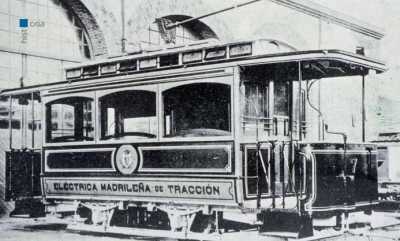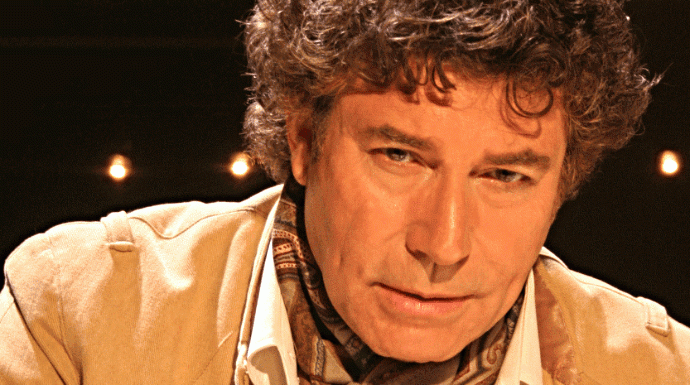October 3
Saint’s Day for Francisco de Borja and San Gerardo, Dionisio, Fausto and Cayo.
1700 - The last of the Spanish Hapsburgs, Carlos II, named his great-nephew Philip of Anjou his heir in his will on this day. Carlos died on 1st November and Philip became Felipe V of Spain and the first King of the Bourbon dynasty.

The first electric tram in Madrid - photo - http://www.vialibre-ffe.com/pdf/7575_TRANVIAMADRDID-545.pdf
1898 - The first electric tram starts operating in Madrid.
1904 - Saguia el-Hamra is annexed to Spain.
1987 - In his first official visit to Californian lands, Juan Carlos I of Spain celebrates a diplomatic and friendly meeting, with strong cultural interests, with Clint Eastwood, Mayor of Carmel.
2009 - Basque tuna boat Alakrana is kidnapped by Somali pirates. The captivity lasted 47 days.
2014 - In the German city of Hattingen, Queen Sofia, Queen Emeritus of Spain, it is awarded the Steiger 2014 Solidarity Award for its work primarily through the Foundation that bears his name, with praise or laudatio musician Peter Maffay.
Irresponsible conduct - ‘They could at risk the current economic and social stability in Cataluña’ Difficult times – ‘We will overcome because we believe in our country and we are proud of how we are’ Firmness – ‘I underline my compromise as King with the unity and permanence of Spain’
Births
1868 - Francisco Vidal y Barraquer, cardinal (d. 1943)
1876 - Salvador Giner Gomis, missionary priest whose activity is mainly developed between Peru and Colombia. He fell ill with leprosy in 1944 and spent his last years in the Sanatorium-Cologne "Baldomero Sommer" of Buenos Aires.
1880 - Juan March Ordinas, entrepreneur and financier.

1911 - Maria de las Mercedes de Borbón Bavaria and, third daughter of infants Ferdinand Maria of Bavaria and Infanta Maria Teresa of Spain.
1918 - Pedro Lazaga, director and film screenwriter (d. 1979)
1921 - Alberto Closas, actor.
1934 - Rodolfo Martin Villa politician.
1943 - Jesús Mariñas, journalist.
1948 - Pedro del Hierro, designer and fashion designer.
1958 - Candido Sibilio, Dominican basketball player nationalized Spanish.
1962 - Juan Antonio Ruiz Roman, "Spartacus", bullfighter.
1980 - Ruben Ochandiano, actor.
1982 - El Juli, bullfighter.
Deaths
1568 - Isabel de Valois, daughter of King Henry II of France and 3rd wife of Philip II, dies in childbirth aged 23
1611 - Margaret of Austria, Queen of Spain, Queen consort of Spain (1598-1611)(b. 1594)
1667 - Alonso Cano, painter. (b.1601)
1685 - Juan Carreño de Miranda, painter (b. 1614)
1820 - Vicente Emparan, soldier (b. 1747)
1941 - Emiliano Iglesias, politician (b. 1878)
1943 - Emilio Cebrián Ruiz, composer (b. 1900)
1995 - Juan Antonio Toledo, painter (b. 1940)
2006 - Antonio José Betancor, director of Spanish cinema(b. 1942)
2006 - Antonio González Calderón, journalist and screenwriter (b. 1915)
2007 - Pablo Palazuelo, painter, and sculptor (b.1915)
2010 - Mansur Escudero, Islamist psychiatrist and doctor (b. 1947)

Quintero's flagship program, with schemes that would revolutionize the media was El hombre de la roulot (Man of Roulotte) and El loco de la colina (The fool on the hill), which made him a social phenomenon even outside Spain, Argentina or Uruguay.
Quintero also appeared as a lecturer in the teaching world, such as when he delivered the conference Journalism and Commitment on 17 October 2002 at the Faculty of Communication Sciences of the University of Málaga, on his tenth anniversary. After this speech, he unveiled a plaque to baptize one of the classrooms of the center with his name, sign of respect and admiration that produces the journalist.
Quintero was producer of the singer Soledad Bravo and guitarist Paco de Lucía.
Quintero was author of the books Trece noches (Thirteen nights) (1999) with Antonio Gala, Cuerda de presos (Prisoners Rope) (1997) and Jesús Quintero: entrevista (Jesús Quintero: Interview) (2007). (b. 1940)
